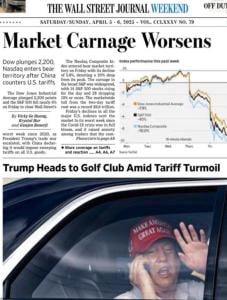My first post on the Trump Tariffs is four days old now, so let’s see how it holds up. This first part, at least, was accurate:
Nobody really knows what’s going to be announced in the next steps of Trump’s GWOT (Global War on Trade), or what parts of what’s announced today will be walked back later this evening or tomorrow or next week. Chaos is likely. Chaos seems to be the plan, to the extent there is any.

The next bit was an extremely cynical, bitterly pessimistic prediction. Here I ran into the problem one often does with Trump in trying to imagine worst-case scenarios — the truth will often turn out even worse than what you were imagining.
I expected the tariff scheme to be mainly a kind of shake-down — a threat intended to coerce concessions, some of which might be to the benefit of America, but most of which would serve to personally enrich the president himself, his family business, or his various cronies and creditors.
Here’s what I wrote:
The main thing I expect from Tariff Day and from the days/weeks of clarification and qualification to follow is talk of “flexibility” and “exemptions” and similar language indicating that the blanket, across-the-board policy of taxing imports won’t necessarily be applied to all such imports from all such countries or companies. This is how the corruption works — the shakedown for, essentially, kickbacks, bribes, vigorish, etc.
David Dayen, writing one day after Tariff Day, had a similar interpretation and expectation: “They’re Not Tariffs, They’re Sanctions: Stop trying to place coherence on a policy that’s really just a mob boss breaking legs and asking for protection money.”
But it seems our ultra-pessimistic take regarding the tariffs as blatant mafia-style corruption were overly optimistic. Over the past few days it has become clear that this isn’t like the wiseguy’s veiled threat — “Nice business ya got here. Shame if anything happened to it.” What that means, of course, is “Pay me ‘protection’ money or else I’ll burn it all down.” And what Trump is doing is just skipping that middle step. He’s less interested in the protection money than he is just simply eager to burn it all down. He’s less a mobster than he is an arsonist.
Or, I suppose, he’s both a mobster and an arsonist. His “plan” seems to be to burn it all down and then collect the protection money. That doesn’t make any sense, but that’s where we are — none of this makes any sense.
Paul Campos summarizes this well:
Trump is extremely stupid, extremely evil, and extremely mentally ill. I’ve noticed that very many people have an overwhelming desire to deny one or more of these things. The most common defense mechanism is to deny the stupid and mentally ill parts, and just treat him as some sort of criminal mastermind. For example, there’s a bunch of stuff out there now about how the chaotic tariff regime is “really” just an extortion scheme, by which Trump can force businesses and countries to beg him for exemptions. I mean it is that in part, but Trump has been babbling about the magical power of tariffs for decades, long before he had any prospect of being in a position to use them as part of his venal rackets. In other words, yes he really is that stupid: he thinks a trade deficit means that the country running the surplus is ripping off the country with the deficit. Like all extremely stupid people, he thinks that a complex issue has a simple answer, and he can’t be talked out of that view because he’s extremely stupid. This doesn’t mean he isn’t also extremely crooked, and will therefore use his extremely stupid beliefs about tariffs to try to extort people: he is, and he will.
Over the past three days, Trump himself has repeatedly confirmed that “he thinks a trade deficit means that the country running the surplus is rippling off the country with the deficit.” He has emphasized, several times, that his goal is not to end other countries’ tariffs, but to end their trade surpluses. And he insists his tariffs will remain — and increase — until the U.S. has a trade surplus with every other country. This is, as numerous observers have said, no different than if you refused to buy anything at the supermarket until the supermarket agreed to buy an equal or greater number of things from you. (See also this xkcd.)
“A deficit is a loss,” Trump said. “We’re going to have surpluses, or we’re, at worst, going to be breaking even.”
So his declared goal is to keep the tariffs in place until every other nation in the world — including the penguins of the Heard and McDonald Islands — imports more from the US than it exports to the US. This is not possible. Nor would it be a good thing even if it were possible.
Mark Herrmann attempts to forecast some rational end to this irrational trade war. That’s probably futile, but his discussion of the situation for a country like Lesotho illuminates the insanity of Trump’s “plan”:
It’s entirely possible that Trump will notice the economic pain that he’s inflicting on Americans next week, pick some country with which to negotiate, declare victory, and reduce the tariffs on that country or one of its products.
It’s possible that the political leader of Lesotho, whoever that is, will call Trump to explain: “You’re correct that Lesotho runs a trade surplus with the United States. But that’s because we’re a very poor country and cannot afford to buy your products, while you’re a very rich country and buy many of the diamonds that we mine here. It’s unlikely that the 50% tariff that you’re imposing on Lesotho will cause us to buy more from you, although that tariff is essentially sure to raise the price of diamonds in the United States. Do you suppose you could make an exception to your tariff policy for Lesotho alone?”
Perhaps Trump would agree.
Or perhaps the leader of Lesotho would go on: “That’s why, when imposing tariffs, you must consider the situation of each country and each product individually, rather than imposing formulaic tariffs on every country in the world, you damned moron.”
But then Trump would get upset and double the tariff on Lesotho, just to show them who’s boss.
As Bloomberg Africa economist Yvonne Mhango points out in the case of Lesotho, “African countries are being penalized for having trade surpluses, some of them achieved by pursuing export-driven development policies, as advised by the U.S.”
But it’s not just that a trade-war with Lesotho makes as little sense as a trade-war with penguins. This is a trade-war with the entire rest of the world, and none of it makes any sense at all.
As Paul Krugman notes, “the administration’s case for tariffs is completely incoherent.” It has, he says, at least “two major internal contradictions”:
Trumpers are claiming that tariffs
1. Won’t increase prices, because foreign producers will absorb the cost
2. Will cause a large shift in U.S. demand away from imports to domestic production
3. Will raise huge amounts of revenue
If you think about it for a minute, you realize that (1) is inconsistent with (2): If prices of imports don’t rise, why would consumers switch to domestically produced goods? At the same time, (2) is inconsistent with (3): If imports drop a lot, tariffs won’t raise a lot of money, because there won’t be much to tax.
You can think of this as the sin-tax problem of tariffs. You can levy a tax on cigarettes as a way to discourage people from smoking. Or you can levy a tax on cigarettes to create a reliable, long-term source of revenue. But you can’t do both at the same time.
And but so, we have a incoherent, contradictory, and massively, globally destructive policy that Trump is adamant on imposing on the world until it achieves his imagined goal, which is also both impossible and undesirable. How does this end?
Not well, and probably not soon. As Campos writes:
There’s no formal legal solution in our system to any of this, other than waiting for the next round of national elections. Some people are talking about the 25th amendment (again), but that is a much more cumbersome process than impeachment and conviction, and the latter can’t be used because the Republican party is a cult, and part of the cult’s identity is that Donald Trump is a god-like savior figure, not the perpetrator of high crimes and misdemeanors. Trump’s stupidity and evil and madness are going to continue largely unimpeded until at least November of next year, absent solutions that are extremely prejudicial to formal legal processes.













